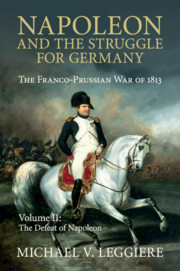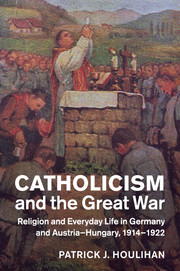Refine search
Actions for selected content:
15418 results in Military history
17 - The Habsburg Empire's German-speaking public sphere and the First Balkan War
- from Part IV - The wars in the European public sphere
-
-
- Book:
- The Wars before the Great War
- Published online:
- 05 June 2015
- Print publication:
- 07 May 2015, pp 301-319
-
- Chapter
- Export citation
Contributors
-
- Book:
- The Wars before the Great War
- Published online:
- 05 June 2015
- Print publication:
- 07 May 2015, pp viii-x
-
- Chapter
- Export citation
18 - From ‘illusion’ and ‘Angellism’ to détente – British radicals and the Balkan Wars
- from Part IV - The wars in the European public sphere
-
-
- Book:
- The Wars before the Great War
- Published online:
- 05 June 2015
- Print publication:
- 07 May 2015, pp 320-342
-
- Chapter
- Export citation
12 - Between Manchuria and the Marne: the German army and its perception of the military conflicts of 1911–1914
- from Part II - The European military between real and imagined wars
-
-
- Book:
- The Wars before the Great War
- Published online:
- 05 June 2015
- Print publication:
- 07 May 2015, pp 204-230
-
- Chapter
- Export citation
20 - Socialism and the challenge of the Balkan Wars 1912–1913
- from Part IV - The wars in the European public sphere
-
-
- Book:
- The Wars before the Great War
- Published online:
- 05 June 2015
- Print publication:
- 07 May 2015, pp 359-372
-
- Chapter
- Export citation
6 - War, civic mobilization and the Ottoman home-front during the Balkan Wars: the case of children
- from Part I - The belligerents
-
-
- Book:
- The Wars before the Great War
- Published online:
- 05 June 2015
- Print publication:
- 07 May 2015, pp 92-113
-
- Chapter
- Export citation
Part I - The belligerents
-
- Book:
- The Wars before the Great War
- Published online:
- 05 June 2015
- Print publication:
- 07 May 2015, pp 19-148
-
- Chapter
- Export citation
15 - Entente diplomacy v. détente, 1911–1914
- from Part III - The wars and Great Power politics
-
-
- Book:
- The Wars before the Great War
- Published online:
- 05 June 2015
- Print publication:
- 07 May 2015, pp 264-282
-
- Chapter
- Export citation

Napoleon and the Struggle for Germany
- The Franco-Prussian War of 1813
-
- Published online:
- 05 May 2015
- Print publication:
- 16 April 2015

Catholicism and the Great War
- Religion and Everyday Life in Germany and Austria-Hungary, 1914–1922
-
- Published online:
- 05 May 2015
- Print publication:
- 16 April 2015
Frontmatter
-
- Book:
- Britannia's Shield
- Published online:
- 09 March 2018
- Print publication:
- 04 May 2015, pp i-iv
-
- Chapter
- Export citation
Chapter 9 - ‘Quite as much political and imperial, as it is military’
-
- Book:
- Britannia's Shield
- Published online:
- 09 March 2018
- Print publication:
- 04 May 2015, pp 199-223
-
- Chapter
- Export citation
Chapter 11 - ‘Hopelessly ignorant of our self-governing Colonies’
-
- Book:
- Britannia's Shield
- Published online:
- 09 March 2018
- Print publication:
- 04 May 2015, pp 249-272
-
- Chapter
- Export citation
Photographs
-
- Book:
- Britannia's Shield
- Published online:
- 09 March 2018
- Print publication:
- 04 May 2015, pp ix-x
-
- Chapter
- Export citation
Chapter 1 - ‘The common duties of the Empire’
-
- Book:
- Britannia's Shield
- Published online:
- 09 March 2018
- Print publication:
- 04 May 2015, pp 14-39
-
- Chapter
- Export citation
Copyright page
-
- Book:
- Britannia's Shield
- Published online:
- 09 March 2018
- Print publication:
- 04 May 2015, pp iv-iv
-
- Chapter
- Export citation
11 - ‘Hopelessly ignorant of our self-governing Colonies’: The new Australian army and imperial defence, 1902–04
-
- Book:
- Britannia's Shield
- Published online:
- 09 March 2018
- Print publication:
- 04 May 2015, pp 249-272
-
- Chapter
- Export citation
1 - ‘The common duties of the Empire’: Developments in the imperial defence idea, 1848–92
-
- Book:
- Britannia's Shield
- Published online:
- 09 March 2018
- Print publication:
- 04 May 2015, pp 14-39
-
- Chapter
- Export citation
6 - ‘Making soldiers of them rapidly’: Reforming the Canadian militia, 1898–99
-
- Book:
- Britannia's Shield
- Published online:
- 09 March 2018
- Print publication:
- 04 May 2015, pp 136-151
-
- Chapter
- Export citation
Chapter 8 - ‘Pregnant of great results’
-
- Book:
- Britannia's Shield
- Published online:
- 09 March 2018
- Print publication:
- 04 May 2015, pp 173-198
-
- Chapter
- Export citation
